
MARINE AND FRESHWATER RESEARCH
Scope & Guideline
Unveiling the mysteries of our waters.
Introduction
Aims and Scopes
- Aquatic Biodiversity and Conservation:
Research on the diversity of aquatic species, including fish, invertebrates, and plants, with a focus on conservation strategies and biodiversity assessments. - Ecosystem Dynamics and Management:
Studies examining the interactions within aquatic ecosystems, including the effects of anthropogenic influences, climate change, and habitat alterations. - Water Quality and Pollution Studies:
Investigations into water quality parameters and the impact of pollutants on aquatic life, including monitoring of contaminants and their ecological implications. - Freshwater and Marine Fisheries Research:
Research on fish populations, their life histories, and the sustainability of fisheries, addressing management practices and ecological impacts. - Wetland Ecology and Management:
Studies focused on the ecological functions of wetlands, their biodiversity, and the challenges of managing these vital ecosystems in the face of environmental change. - Technological Innovations in Aquatic Research:
Utilization of advanced methodologies such as environmental DNA (eDNA) monitoring, acoustic telemetry, and remote sensing to study aquatic environments.
Trending and Emerging
- Climate Change Impacts on Aquatic Systems:
There is an increasing focus on the effects of climate change on aquatic ecosystems, including shifts in species distributions, habitat changes, and adaptive management strategies. - Ecosystem Services and Socio-Ecological Systems:
Research examining the social, economic, and ecological interactions within aquatic systems is gaining traction, highlighting the importance of integrated management approaches. - Microplastics and Environmental Health:
The investigation of microplastics in aquatic environments has surged, emphasizing their impact on biodiversity and food webs, alongside public health concerns. - Genetic and Genomic Studies:
The use of genetic tools, including eDNA and genomic analyses, is expanding, allowing for better understanding of species diversity, population dynamics, and conservation genetics. - Innovative Water Management Practices:
Emerging research is focusing on innovative approaches to water management, including the use of technology and policy frameworks to enhance ecosystem resilience.
Declining or Waning
- Traditional Aquaculture Practices:
Research related to conventional aquaculture methods has decreased, possibly due to a shift towards more sustainable and innovative practices that prioritize ecological health. - Invasive Species Management:
While still relevant, the volume of studies specifically targeting invasive species has declined as the focus may be shifting towards broader ecological impacts and management strategies. - Historical Ecology Studies:
Research concentrating on historical baselines and ecology is less prevalent, as contemporary studies emphasize real-time ecological assessments and immediate conservation actions. - Single Species Focus in Conservation:
There is a noticeable reduction in studies focusing solely on individual species conservation efforts, with a growing emphasis on ecosystem-based approaches instead. - Pollution Remediation Techniques:
Research on specific remediation techniques for pollution, particularly in freshwater systems, has waned, possibly as a result of increased focus on prevention and policy-driven approaches.
Similar Journals
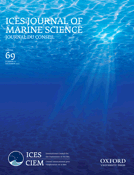
ICES JOURNAL OF MARINE SCIENCE
Charting the Course for Future Marine DiscoveriesThe ICES Journal of Marine Science, published by Oxford University Press, stands at the forefront of marine research, offering cutting-edge insights into aquatic sciences and oceanography since its inception in 1903. With its ISSN 1054-3139 and E-ISSN 1095-9289, this esteemed journal has garnered a reputation for excellence, evidenced by its Q1 rankings in categories such as Aquatic Science, Ecology, and Oceanography as of 2023. The journal's commitment to advancing knowledge in marine systems makes it an essential resource for researchers, professionals, and students alike, who are keen to explore the intricate ecosystems that sustain our planet. Without an open access model, the journal maintains a rigorous editorial standard and is recognized among the top journals, ranking impressively in various Scopus categories. Authored contributions reflect pioneering research that informs policy and fosters sustainable practices, making this journal a critical platform for disseminating marine science knowledge.
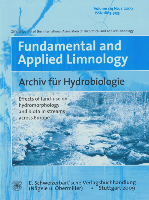
Fundamental and Applied Limnology
Unveiling Aquatic Mysteries: A Platform for Freshwater ScholarshipFundamental and Applied Limnology is an esteemed academic journal dedicated to the exploration of freshwater ecosystems, bridging the gap between fundamental research and practical applications. Published by E Schweizerbart'sche Verlagsbuchhandlung in Germany, this journal has been a vital resource in the fields of aquatic science and ecology since its inception in 2007. With its ISSN 1863-9135 and E-ISSN 1863-9135, it provides a platform for researchers to disseminate significant findings related to limnology, contributing to a rich understanding of freshwater biodiversity, water quality, and ecological interactions. Although currently rated in the Q3 quartile for aquatic sciences and ecology as per the 2023 rankings, it remains a valuable outlet for interdisciplinary research and practical insights, facilitating critical advancements in environmental management. Open access options enhance its visibility and accessibility, making it indispensable for researchers, professionals, and students alike who are committed to advancing the scholarship in freshwater studies. Engaging with this journal not only opens doors to the latest research findings but also fosters collaboration and innovation in the ecological community.

International Journal of Limnology
Championing Research in Aquatic EcosystemsThe International Journal of Limnology, published by EDP SCIENCES S A, is a cutting-edge journal dedicated to the field of aquatic sciences, with a strong emphasis on limnology—the study of inland waters. Headquartered in France, the journal serves as a vital resource for scholars and practitioners alike, aiming to advance the understanding of freshwater ecosystems and their management. With an e-ISSN of 2823-1465 and classified within the Q3 category of the 2023 Aquatic Science quartiles, it occupies a significant niche in academic research, ranking 150 out of 247 in Scopus listings. The journal’s open access policy ensures that research findings are widely disseminated, facilitating collaboration and innovation across global aquatic science communities. Published continuously from 2022 to 2024, the International Journal of Limnology aspires to contribute to sustainable practices and enhance ecological understanding, making it an essential publication for researchers, professionals, and students committed to the stewardship of aquatic resources.
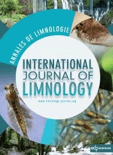
ANNALES DE LIMNOLOGIE-INTERNATIONAL JOURNAL OF LIMNOLOGY
Unveiling the Secrets of Freshwater EcosystemsANNALES DE LIMNOLOGIE-INTERNATIONAL JOURNAL OF LIMNOLOGY is a distinguished scientific journal dedicated to the field of limnology, focusing on freshwater ecosystems and their ecological dynamics. Published by EDP SCIENCES S A, this journal has been a vital resource for researchers and professionals since 1965, fostering a deep understanding of aquatic environments through quality research and scholarly discussions. The journal was indexed in Scopus, where it ranked in the 37th percentile within the Agricultural and Biological Sciences category, emphasizing its contribution to aquatic science. While its coverage has been discontinued in Scopus since 2021, the journal continues to engage its readership with critical insights and reviews in limnology. ANNALES DE LIMNOLOGIE promotes open access to facilitate the dissemination of valuable knowledge, making it an essential platform for students, researchers, and professionals who strive to advance our understanding of freshwater systems.

LIMNOLOGY AND OCEANOGRAPHY-METHODS
Driving innovation in limnology and oceanography research.LIMNOLOGY AND OCEANOGRAPHY-METHODS is a premier journal published by WILEY, dedicated to advancing the understanding of methodologies in limnology and oceanography. With an ISSN of 1541-5856, this esteemed publication has established itself within the academic community, holding a solid Impact Factor and proudly ranking in the Q1 category for Ocean Engineering according to 2023 metrics. The journal, which has been converged since 2003, encompasses a broad scope that includes innovative techniques and applications essential for aquatic research and environmental monitoring. As a leader in the field, it is ranked #32 out of 105 journals in Ocean Engineering, placing it within the 70th percentile of its category. While it operates under subscription access, LIMNOLOGY AND OCEANOGRAPHY-METHODS serves as an invaluable resource for researchers, professionals, and students alike, providing critical insights that drive advancements in aquatic sciences.
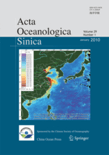
ACTA OCEANOLOGICA SINICA
Advancing Oceanographic Knowledge Since 1985ACTA OCEANOLOGICA SINICA, published by SPRINGER, stands as a significant voice in the fields of Aquatic Science and Oceanography, contributing vital research and insights since its inception in 1985. With an ISSN of 0253-505X and an E-ISSN of 1869-1099, this journal maintains a strong international focus, delivering high-quality peer-reviewed articles that address pressing marine and freshwater environmental issues. Although it operates under a subscription model, its Q3 ranking in both Aquatic Science and Oceanography demonstrates its solid standing within Scopus, placing it in the 48th and 44th percentiles respectively. The journal aims to foster knowledge exchange and collaboration among researchers, professionals, and students by providing a platform for innovative studies and comprehensive reviews. With a dedicated editorial board and a commitment to advancing scientific understanding, ACTA OCEANOLOGICA SINICA serves as an essential resource for anyone engaged in the study of oceanographic phenomena and aquatic ecosystems.
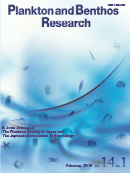
Plankton & Benthos Research
Exploring the Depths of Aquatic EcosystemsPlankton & Benthos Research, published by the Plankton Society of Japan, serves as a pivotal platform in the fields of Aquatic Science, Ecology, and Oceanography. With its inception in 2006 and ongoing publication until 2024, this esteemed journal focuses on the complex interactions within aquatic ecosystems, emphasizing the significance of plankton and benthic organisms in maintaining ecological balance. Although it is categorized in the Q3 quartile across several disciplines, it continues to provide valuable insights and a forum for researchers to share innovative findings and methodologies. The journal is not currently open access, which ensures a layer of curator-driven content quality. Its impact, measured through Scopus rankings, showcases its role in fostering knowledge exchange among academics and professionals engaged in ecological and environmental studies. With an ISSN of 1880-8247 and E-ISSN 1882-627X, Plankton & Benthos Research invites contributions that enhance our understanding of the aquatic realm, establishing itself as a crucial resource for ongoing research and advancement in these essential fields.

Aquatic Biology
Advancing Knowledge in Aquatic EcosystemsAquatic Biology, published by INTER-RESEARCH, is a leading open-access journal dedicated to the scientific exploration of aquatic ecosystems, promoting innovative research in the fields of aquatic science, ecology, and oceanography since its inception in 2007. With an E-ISSN of 1864-7782, the journal publishes original articles, reviews, and data papers that contribute to the understanding of aquatic biology in its myriad forms. As of 2023, it holds a respectable Q3 ranking across multiple categories including Aquatic Science and Ecology, reflecting its sustained impact within the scientific community. Situated in Germany, Aquatic Biology operates a policy of open access since 2014, ensuring that valuable research findings are readily available to researchers, professionals, and students worldwide, thus fostering collaboration and knowledge dissemination. By addressing diverse aquatic topics, the journal plays a crucial role in advancing the study and conservation of marine and freshwater environments, making it an essential resource for anyone seeking to deepen their understanding of aquatic systems.

Latin American Journal of Aquatic Research
Empowering Researchers to Dive Deeper into Aquatic StudiesLatin American Journal of Aquatic Research (ISSN: 0718-560X) is a distinguished scholarly publication that has been paving the way for aquatic science research since its transition to Open Access in 2008, allowing unhindered access to diverse scientific inquiries conducted in Latin America and beyond. Published by Pontificia Universidad Catolica de Valparaiso in Chile, this journal serves as a vital platform for researchers and practitioners in the fields of Aquatic Science and Oceanography. With an esteemed Q3 ranking in both categories as of 2023, it is dedicated to disseminating high-quality research findings that address pressing ecological and biological challenges. The journal’s reach and impact are reflected in its Scopus rankings, where it stands at the 36th percentile in Oceanography and the 35th percentile in Aquatic Science. Researchers, professionals, and students alike will find valuable insights and data-driven articles that further the understanding of aquatic ecosystems, making it an essential resource for ongoing studies and future innovations.

Ocean and Coastal Research
Advancing marine science for a sustainable future.Ocean and Coastal Research, published by the Institute Oceanográfico of the University of São Paulo, is an essential academic journal dedicated to advancing the fields of Aquatic Science, Oceanography, and Water Science and Technology. Established in 2020, the journal has quickly become a noteworthy platform contributing to the understanding and sustainable management of marine and coastal ecosystems, with an open access model that promotes the dissemination of critical research findings. Although currently categorized in the fourth quartile across its respective fields in 2023, the journal serves as an emerging repository of valuable insights for researchers, professionals, and students alike, aiming to make impactful discoveries that address contemporary challenges in ocean conservation and resource management. The journal's editorial team is committed to fostering interdisciplinary collaboration and upholding rigorous peer-review standards, thereby ensuring high-quality contributions that reflect the dynamic nature of marine science. With an E-ISSN of 2675-2824, all access to published articles is freely available, supporting global research efforts addressing crucial environmental issues.